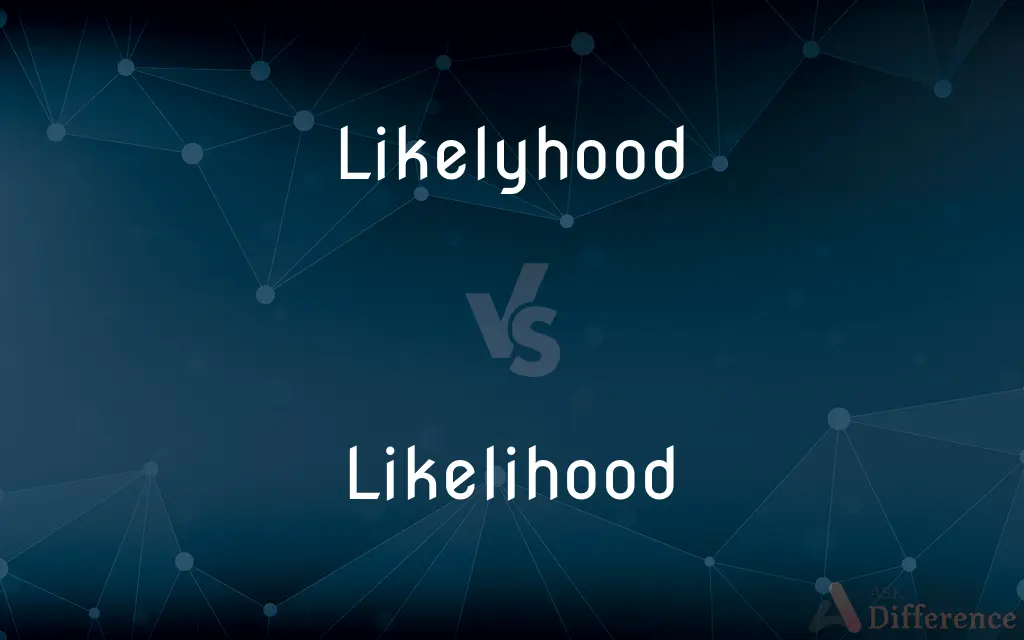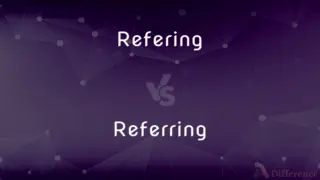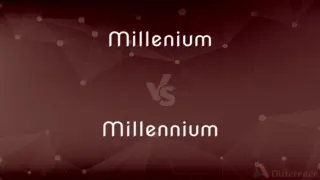Likelyhood vs. Likelihood — Which is Correct Spelling?
Edited by Tayyaba Rehman — By Fiza Rafique — Updated on March 19, 2024
"Likelyhood" is an incorrect spelling. The correct form is "likelihood," referring to the probability or chance of something happening.

Table of Contents
Which is correct: Likelyhood or Likelihood
How to spell Likelihood?

Likelyhood
Incorrect Spelling

Likelihood
Correct Spelling
ADVERTISEMENT
Key Differences
Associate "likelihood" with "probability" which both have "i" after the 'l'.
Remember "likely" + "hood" forms "likelihood."
Mentally split it: likely-hood.
Recall that "hood" is a common suffix, as in "brotherhood" or "childhood."
Think of "neighborhood"; just as it doesn't drop the 'h', neither does "likelihood."
ADVERTISEMENT
How Do You Spell Likelihood Correctly?
Incorrect: Many believe in the likelyhood of extraterrestrial life.
Correct: Many believe in the likelihood of extraterrestrial life.
Incorrect: The likelyhood of winning the lottery is very slim.
Correct: The likelihood of winning the lottery is very slim.
Incorrect: He thought the likelyhood of rain was high.
Correct: He thought the likelihood of rain was high.
Incorrect: The likelyhood of her accepting the offer is quite low.
Correct: The likelihood of her accepting the offer is quite low.
Incorrect: The project's success depends on the likelyhood of timely funding.
Correct: The project's success depends on the likelihood of timely funding.
Likelihood Definitions
A measure of the expected occurrence of an event.
The likelihood of winning the lottery is slim.
The chance or probability of something happening.
The likelihood of rain tomorrow is high.
The state of being probable or likely.
Given his experience, the likelihood of his success is great.
A statistical measure showing the fit of a model to data.
Model A has a better likelihood ratio than Model B.
An estimation of an event's occurrence based on evidence.
Recent changes indicate a higher likelihood of policy shifts.
The state or fact of something's being likely; probability
Situations where there is a likelihood of violence
Young people who can see no likelihood of finding employment
The state of being probable; probability.
Something probable.
The probability of a specified outcome; the chance of something happening; probability; the state or degree of being probable.
In all likelihood the meeting will be cancelled.
The likelihood is that the inflation rate will continue to rise.
The probability that some fixed outcome was generated by a random distribution with a specific parameter.
Likeness, resemblance.
(archaic) Appearance, show, sign, expression.
Appearance; show; sign; expression.
What of his heart perceive you in his faceBy any likelihood he showed to-day ?
Likeness; resemblance.
There is no likelihood between pure light and black darkness, or between righteousness and reprobation.
Appearance of truth or reality; probability; verisimilitude.
Statistical probability; probability of being true or of occurring in the future; as, the likelihood of being abducted by aliens is close to zero..
The probability of a specified outcome
Likelihood Meaning in a Sentence
The likelihood of rain makes me want to stay indoors.
The likelihood of finding a four-leaf clover in this field is pretty low.
Given his skills, the likelihood of him winning the match is very high.
Considering her grades, the likelihood of getting a scholarship is strong.
In a game of chance, the likelihood of winning varies.
When you look at the dark clouds, the likelihood of a storm seems high.
Understanding the likelihood of different outcomes helps us make better decisions.
With such heavy traffic, the likelihood of being late is almost certain.
The likelihood of snow in Florida is almost zero.
The likelihood of success increases with hard work.
Eating healthy increases the likelihood of living a longer life.
By studying, you can increase the likelihood of passing your tests.
The likelihood of encountering wildlife increases in remote areas.
Practicing safety measures reduces the likelihood of accidents.
The likelihood of finding a good job increases with education.
Keeping your phone charged reduces the likelihood of it dying when you need it most.
The likelihood of making a profit from this venture seems promising.
Wearing a helmet increases the likelihood of safety on a bike.
The likelihood of enjoying the movie is high if you like the genre.
The likelihood of rain decides whether I bring an umbrella.
The likelihood of making new friends is higher when you're open and friendly.
Without practice, the likelihood of improvement is minimal.
The likelihood of confusion decreases with clear instructions.
The likelihood of getting sunburned increases without sunscreen.
Observing the sky at night increases the likelihood of seeing a shooting star.
Common Curiosities
What is the root word of likelihood?
The root word is "likely."
What is the verb form of likelihood?
The related verb is "likely."
Why is it called likelihood?
It's called "likelihood" as it denotes the state or quality of being likely.
What is the singular form of likelihood?
"Likelihood" is in its singular form.
Which conjunction is used with likelihood?
There's no specific conjunction exclusively used with "likelihood."
What is the pronunciation of likelihood?
It's pronounced as /ˈlaɪkliˌhʊd/.
Which vowel is used before likelihood?
The vowel "i" is used before the "-hood" in "likelihood."
Is likelihood a noun or adjective?
"Likelihood" is a noun.
What is the plural form of likelihood?
The term "likelihoods" can be used, though it's rare.
Is likelihood an abstract noun?
Yes, "likelihood" is an abstract noun.
Which preposition is used with likelihood?
"Of" as in "likelihood of rain."
Is likelihood a vowel or consonant?
"Likelihood" is a word containing both vowels and consonants.
What is the third form of likelihood?
"Likelihood" is a noun and doesn't have verb forms.
Is likelihood a negative or positive word?
"Likelihood" is neutral; its connotation depends on context.
Is likelihood a collective noun?
No, "likelihood" is not a collective noun.
Is the word likelihood imperative?
No, "likelihood" is not an imperative form.
What is the opposite of likelihood?
The opposite could be "improbability" or "unlikelihood."
Is the likelihood term a metaphor?
No, "likelihood" is not typically used as a metaphor.
What is a stressed syllable in likelihood?
The first syllable, "like", is stressed in "likelihood."
What part of speech is likelihood?
"Likelihood" is a noun.
What is another term for likelihood?
Another term is "probability."
Which article is used with likelihood?
Both "a" and "the" can be used with "likelihood," depending on context.
Is likelihood a countable noun?
It can be countable in some contexts, e.g., "different likelihoods," but it's often used in an uncountable sense.
How many syllables are in likelihood?
There are three syllables in "likelihood."
Which determiner is used with likelihood?
Common determiners include "some," "any," and "the."
What is the first form of likelihood?
"Likelihood" is a noun and doesn't have verb forms.
Is likelihood an adverb?
No, "likelihood" is not an adverb.
How do we divide likelihood into syllables?
"Likelihood" is divided as like-li-hood.
What is the second form of likelihood?
"Likelihood" is a noun and doesn't have verb forms.
How is likelihood used in a sentence?
Example: The likelihood of him arriving on time is very high given his punctuality.
Share Your Discovery

Previous Comparison
Refering vs. Referring
Next Comparison
Millenium vs. MillenniumAuthor Spotlight
Written by
Fiza RafiqueFiza Rafique is a skilled content writer at AskDifference.com, where she meticulously refines and enhances written pieces. Drawing from her vast editorial expertise, Fiza ensures clarity, accuracy, and precision in every article. Passionate about language, she continually seeks to elevate the quality of content for readers worldwide.
Edited by
Tayyaba RehmanTayyaba Rehman is a distinguished writer, currently serving as a primary contributor to askdifference.com. As a researcher in semantics and etymology, Tayyaba's passion for the complexity of languages and their distinctions has found a perfect home on the platform. Tayyaba delves into the intricacies of language, distinguishing between commonly confused words and phrases, thereby providing clarity for readers worldwide.














































